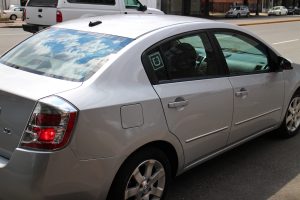Uber is looking to put the brakes on a lawsuit filed against it last month in Chesterfield County.
The popular tech-driven ride-hailing service is arguing that the case, which involves a local businessman and an allegedly dramatic New York City taxi trip, should be tossed out or at least be moved to another court.
Those arguments were filed by Uber on Sept. 1, in response to the claims of Chesterfield resident Terry Phillips and his business associate, Melanie Mroz. The pair said in an Aug. 5 suit that the San Francisco-based company should be held liable for the assault, battery and false imprisonment they allegedly experienced at the hands of Allaoua Chatouk, the taxi driver they hailed in New York using Uber’s smartphone app.
Uber argues that since the incident in question allegedly took place in New York, it isn’t appropriate to be heard in Virginia.
“Defendant objects to venue and requests the Court transfer this matter to an appropriate venue because no ‘practical nexus’ exists to Chesterfield County,” the objection reads.
The company states that it faces “substantial prejudice” if it has to litigate in Chesterfield because it cannot force Chatouk or relevant witnesses to attend trial. Those witnesses include a hotel doorman, according to court records.
Phillips and Mroz based their argument for a Chesterfield venue on the fact that Uber conducts business in Virginia. But Uber said that’s not enough to stand on and adds that Mroz is not a resident of Virginia.
In arguing for dismissal, Uber states that the lawsuit fails to establish that Chatouk was an employee of the company and acted as such during the alleged incident.
“Plaintiffs instead seek to impose liability vicariously,” the company states in its response.
Uber claims that Virginia law in this case defers to the laws of the place where the allegations occurred. It then cites New York law in arguing that Chatouk was not an employee for Uber.
According to Uber’s objection, to be categorized as an employee as opposed to an independent contractor, New York considers whether a company controls the method and means of the work being done.
“Even accepting the allegations in the complaint as true, Plaintiffs have failed to allege facts sufficient to support that Uber had ‘control’ over Chatouk,” the objection reads. “The facts as pleaded do not support the conclusion that Chatouk was acting within the scope of his employment with Uber or in furtherance of Uber’s interests.”
The status of Uber’s drivers is being debated elsewhere in the country. The highly valued company faces a class-action lawsuit in California over the status of its drivers. Uber considers its drivers independent contractors.
Uber is represented by Cynthia Santoni and Eric Burns of Wilson Elser Moskowitz Edelman & Dicker, which is based in McLean, Virginia. Neither could be reached for comment.
In an emailed response for comment on the case, Uber reiterated that Chatouk “was a taxi driver who passed a background check conducted by the New York City Taxi and Limousine Commission and was immediately removed from our platform after the rider reported the incident.”
Phillips and Mroz are represented by Charlottesville attorney Steven Biss, who could not be reached for comment on the objection.
Uber is looking to put the brakes on a lawsuit filed against it last month in Chesterfield County.
The popular tech-driven ride-hailing service is arguing that the case, which involves a local businessman and an allegedly dramatic New York City taxi trip, should be tossed out or at least be moved to another court.
Those arguments were filed by Uber on Sept. 1, in response to the claims of Chesterfield resident Terry Phillips and his business associate, Melanie Mroz. The pair said in an Aug. 5 suit that the San Francisco-based company should be held liable for the assault, battery and false imprisonment they allegedly experienced at the hands of Allaoua Chatouk, the taxi driver they hailed in New York using Uber’s smartphone app.
Uber argues that since the incident in question allegedly took place in New York, it isn’t appropriate to be heard in Virginia.
“Defendant objects to venue and requests the Court transfer this matter to an appropriate venue because no ‘practical nexus’ exists to Chesterfield County,” the objection reads.
The company states that it faces “substantial prejudice” if it has to litigate in Chesterfield because it cannot force Chatouk or relevant witnesses to attend trial. Those witnesses include a hotel doorman, according to court records.
Phillips and Mroz based their argument for a Chesterfield venue on the fact that Uber conducts business in Virginia. But Uber said that’s not enough to stand on and adds that Mroz is not a resident of Virginia.
In arguing for dismissal, Uber states that the lawsuit fails to establish that Chatouk was an employee of the company and acted as such during the alleged incident.
“Plaintiffs instead seek to impose liability vicariously,” the company states in its response.
Uber claims that Virginia law in this case defers to the laws of the place where the allegations occurred. It then cites New York law in arguing that Chatouk was not an employee for Uber.
According to Uber’s objection, to be categorized as an employee as opposed to an independent contractor, New York considers whether a company controls the method and means of the work being done.
“Even accepting the allegations in the complaint as true, Plaintiffs have failed to allege facts sufficient to support that Uber had ‘control’ over Chatouk,” the objection reads. “The facts as pleaded do not support the conclusion that Chatouk was acting within the scope of his employment with Uber or in furtherance of Uber’s interests.”
The status of Uber’s drivers is being debated elsewhere in the country. The highly valued company faces a class-action lawsuit in California over the status of its drivers. Uber considers its drivers independent contractors.
Uber is represented by Cynthia Santoni and Eric Burns of Wilson Elser Moskowitz Edelman & Dicker, which is based in McLean, Virginia. Neither could be reached for comment.
In an emailed response for comment on the case, Uber reiterated that Chatouk “was a taxi driver who passed a background check conducted by the New York City Taxi and Limousine Commission and was immediately removed from our platform after the rider reported the incident.”
Phillips and Mroz are represented by Charlottesville attorney Steven Biss, who could not be reached for comment on the objection.

